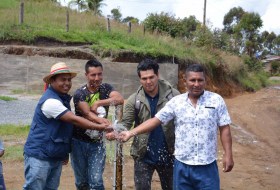News
Unicauca’s research groups work to provide drinking water to KITE KIWE indigenous shelter
Through the research groups of the University of Cauca Development in Information Technology (GTI) and Science and Engineering in Environmental Systems (GCISA), a project was executed to provide water supply and purification in the Nasa indigenous community of KITE KIWE, located in the municipality of Timbío, Cauca.
On December 13, the project 'Water resources management through connectivity, sanitation and social management' was delivered, an initiative framed in the call for Colciencias 'Ideas for Change' that prioritized 10 communities nationwide with population in situation of vulnerability and that will benefit 460 people of the Nasa indigenous community of KITE KIWE, in the municipality of Timbío, Cauca.
The project was funded with science and technology resources from Colciencias and the Ministry of Information and Communications Technologies and was developed with undergraduate students, engineers and Master's students from the Information Technology Development (GTI) research groups and Science and Engineering in Environmental Systems (GCISA).
The initiative managed to implement a scientific - technological solution that allows improving the quality of life of the indigenous community, through the distribution of water and information technologies which allow the community, through the social appropriation of knowledge, to operate the aqueduct system.
According to Christian Muñoz Paz, project researcher and part of the Science and Engineering in Environmental Systems (GCISA) group, the initiative leaves a sustainable system that works through solar panels which mobilize an electric pump that allows the transfer of the affluent; It leads to the highest point of the community, treats the water and thus allows the community to stock up on the water resource.
The water system is accompanied by an application that allows the monitoring of the plant and thus fulfills, with the challenge established by Colciencias where the project should provide solutions from Science, Technology and ICT, to respond to the proposed challenges.
“We were able to develop a technological component application which is the development of an aqueduct and a treatment plant that is only in Cauca. It uses a way of purification different from the others and on the part of the solution of the Information and Communication Technologies, we are leaving an application with a network, in which the community can access through the cell phone, tablet or computer and look the components, the sensors, the quality of water they are drinking and what is happening in their treatment plant, “explained Miguel Ángel Niño Zambrano, professor of the Systems Department of the University of Cauca.
In the same way, he highlighted that from the technologies there is the possibility that the same community can verify the state of the plant and if at any time a pattern becomes outside the ranges, they are self-sufficient to solve it.
Rubiela Ñuescué Díaz, a resident of Kite Kiwe, expressed her joy at having clean water in the homes and thanks the people who joined the cause such as the University of Cauca and the other entities because thanks to her work, after 17 years, they already have the service.
Professor Juan Carlos Casas, professor of Environmental Engineering and director of the Research Group in Science and Engineering in Environmental Systems (GCISA) indicated that despite the fact that the project with Colciencias and the Ministry of Information and Communications Technologies is finished; for the University of Cauca it is just beginning because they have a commitment to the community.
“The project does not end here, it’s just starting and on different fronts. The community has drinking water, but as a university we also have a challenge and it is to support them in the treatment of wastewater that they do not have in the territory, final disposal of solid waste and want productive chains as a coffee brand that they want to legalize before INVIMA. Today we begin processes, which we can accompany with undergraduate and postgraduate students and a very nice path is open for the University of Cauca and to work with these territories”, concluded the teacher.
More Info:
Office of the Vice President for Investigations
Telephone: 057 8209800 Ext. 2633
Email: vri@unicauca.edu.co


